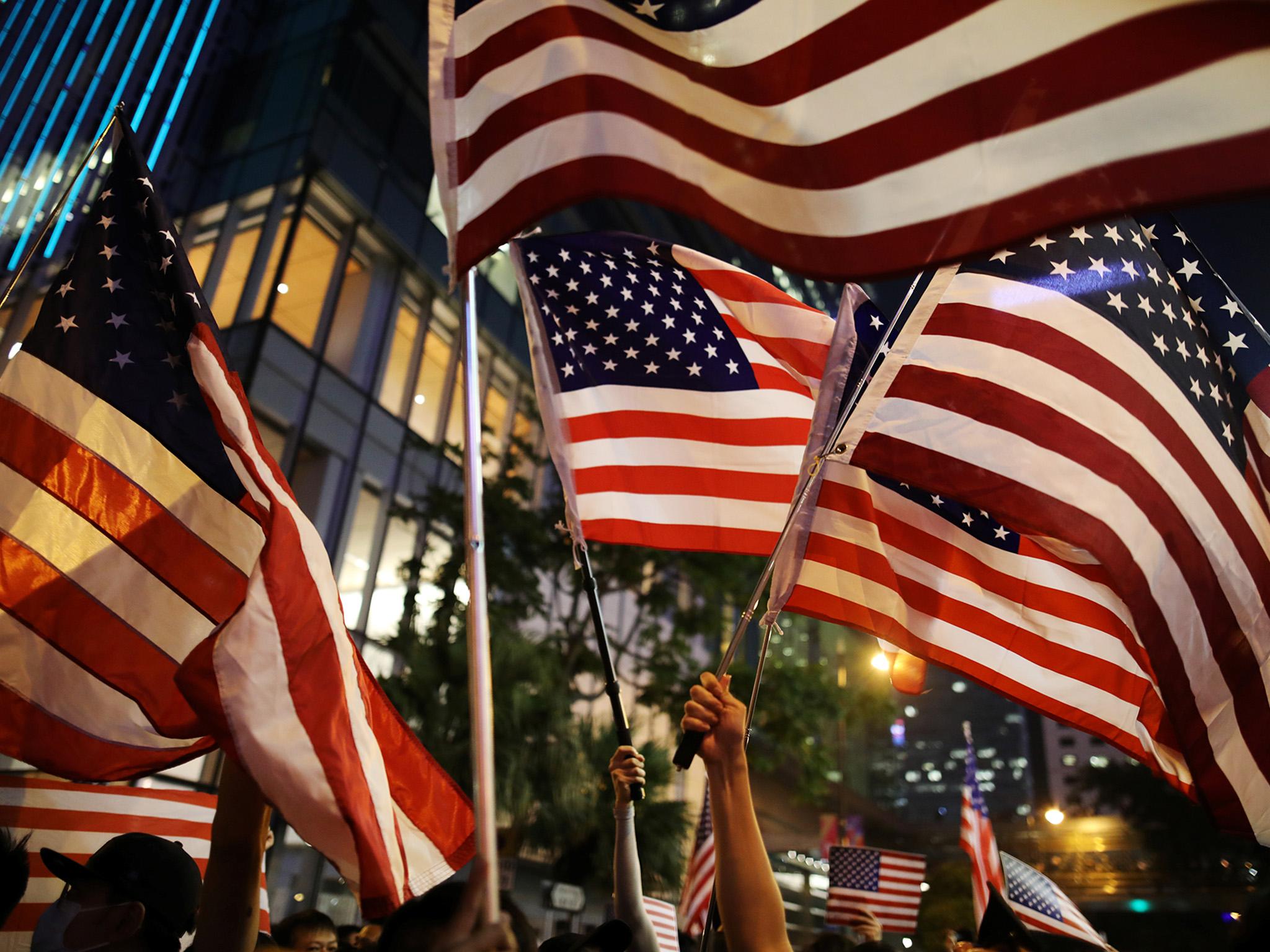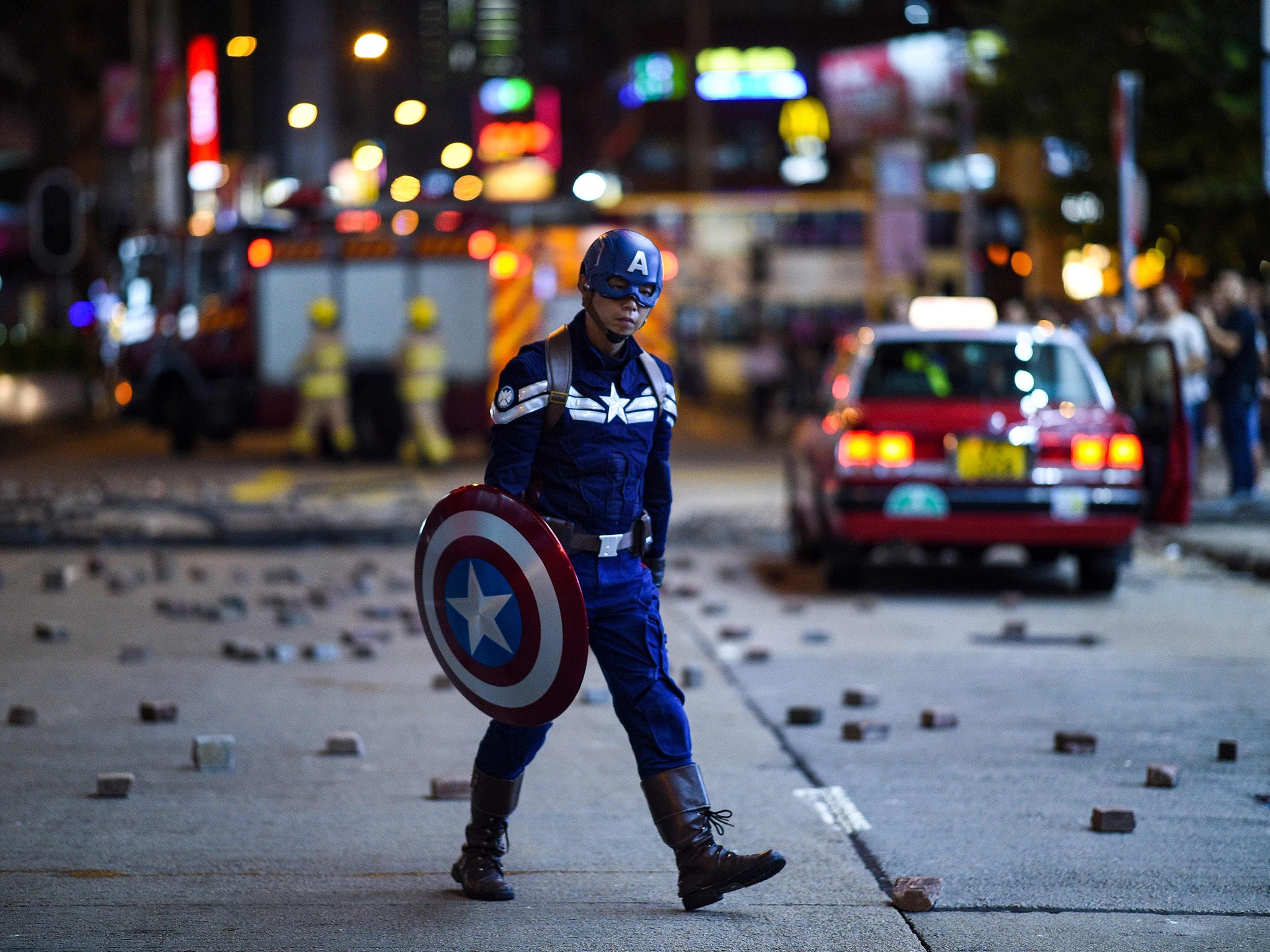Hong Kong protesters' calls for US help is breeding conspiracy in the Chinese government
Demonstrators hope Washington could tip the odds in their favour

Your support helps us to tell the story
From reproductive rights to climate change to Big Tech, The Independent is on the ground when the story is developing. Whether it's investigating the financials of Elon Musk's pro-Trump PAC or producing our latest documentary, 'The A Word', which shines a light on the American women fighting for reproductive rights, we know how important it is to parse out the facts from the messaging.
At such a critical moment in US history, we need reporters on the ground. Your donation allows us to keep sending journalists to speak to both sides of the story.
The Independent is trusted by Americans across the entire political spectrum. And unlike many other quality news outlets, we choose not to lock Americans out of our reporting and analysis with paywalls. We believe quality journalism should be available to everyone, paid for by those who can afford it.
Your support makes all the difference.The Hong Kong protests at times seem like love-fests with the United States. Depending on the day, demonstrators wave American flags or Uncle Sam recruitment posters, and even dress as Captain America, complete with shield.
The United States represents democracy, and the activists hope that maybe, just maybe, it will save Hong Kong. Five months in, they are trying harder than ever to draw the United States into their movement.
The protesters are pressing Hong Kong officials and their overseers, the authoritarian Communist Party leaders of China, for greater democratic rights and rule-of-law in the autonomous territory. As they see it, the Trump administration might be able to make demands of Chinese leaders or Hong Kong officials, especially because members of elite political circles want to maintain access to the United States.
Also, they note, the trade war with China, started by president Donald Trump, is adding pressure overall on president Xi Jinping.
For the US government, the protests are more complicated – a potential policy dilemma but also a potential point of leverage with Beijing and a way to channel US values to the rest of the world.
“The United States should continue to deter Beijing from use of force, maintain an unblinking eye on Hong Kong, and make Beijing pay a heavy reputational cost for curtailing the rights and freedoms of Hong Kong citizens,” said Ryan Hass, a former State Department and National Security Council official now at the Brookings Institution.
Yet, he added, “I worry that the protesters in Hong Kong risk misinterpreting American sympathy and support of their cause for expectation that the United States will shield them from Beijing’s heavy hand.”
If the protesters are sending out a siren song, some US officials and lawmakers are answering it, eager to show their commitment to the cause.
Members of Congress have appeared in Hong Kong in public displays of solidarity. Last month, senator Ted Cruz donned an all-black outfit, while senator Josh Hawley posted photographs from a protest.

In Washington, Nancy Pelosi, the speaker of the House, has met with activists, pro-democracy politicians and Jimmy Lai, a publisher considered radioactive by Beijing. Vice president Mike Pence singled out Hong Kong as a beacon of liberty in a speech, saying, “We stand with you; we are inspired by you.”
And versions of a bill that would give support to the protesters are moving though Congress with bipartisan backing. The legislation, among other things, would allow the United States to impose economic sanctions and a travel ban on Hong Kong officials deemed responsible for human rights abuses.
“We hope this bill will pass,” said Selina Po, a 27-year-old protester wearing a mouth mask in the Admiralty neighbourhood as she held up a sign with the bill’s name, the Hong Kong Human Rights and Democracy Act. “It’s our hope for winning this war. We’re trying all we can.”
But US officials say the country needs to weigh its moves carefully.
Greater involvement by Americans could give Beijing more ammunition in its propaganda effort to portray the pro-democracy movement as one stoked by foreign forces.
The Chinese government and state-run news organisations talk about “black hands” behind the unrest and spread conspiracy theories, including one centred on a US diplomat in Hong Kong who was photographed with activists in the lobby of the JW Marriott Hotel.
As the protests persist, US officials are watching for surges in violence and tracking the movement of People’s Liberation Army soldiers into Hong Kong. Some are beseeching demonstrators to stick to nonviolent tactics, even in the face of police crackdowns and attacks by people sympathetic to Beijing.
On Sunday, at least six people were injured when a man with a knife who is believed to be against the democracy movement attacked a family at a shopping mall. In the melee, the attacker bit off part of the ear of a pro-democracy district council member, Andrew Chiu.
“We’re telling everyone that we interact with, we don’t want violence,” Secretary of state Mike Pompeo said Wednesday. “We think there should be a political solution to the conflict that’s taking place there.”
Two Democratic congressmen, Tom Suozzi and John Lewis, the icon of the American civil rights movement, posted a video last month praising the activists for their “great work” and urging them to stick to nonviolence.
Standing in support of Hong Kongers and preserving Hong Kong’s autonomy should be a priority of the United States and democracies worldwide
Whether the United States takes greater action on Hong Kong hinges on the unpredictable Mr Trump. Administration officials and US lawmakers talk openly about checking the authoritarian impulses of the Chinese Communist Party. But the president rarely, if ever, mentions human rights and democracy, and he has not made strong statements on Hong Kong.
He is a transactional president. In June, he told Mr Xi on a call that he would stay quiet on Hong Kong as long as Washington and Beijing were making progress on trade talks, according to a US official who spoke on the condition of anonymity.
In the eyes of Beijing, there has been no shortage of provocations by US politicians. On 22 October, Ms Pelosi posted on Twitter a photograph of herself on Capitol Hill with three pro-democracy figures – Mr Lai, Martin Lee and Janet Pang.
“My full support and admiration goes to those who have taken to the streets week after week in nonviolent protest to fight for democracy and the rule of law in #HongKong,” she wrote.
On Wednesday, Ms Pelosi slammed the decision by Hong Kong officials to bar activist Joshua Wong from running in local elections. She said it was “another blow against rule of law in Hong Kong and the principle of ‘one country, two systems,’” referring to the foundation for the policy of autonomy that Britain and China agreed would be used to govern the territory.
Ms Pelosi met Mr Wong in Washington in September.
A Chinese foreign ministry spokeswoman, Hua Chunying, lashed out, saying, “It is precisely because of the naked cover-up and connivance of external forces such as Pelosi that the violent anti-law forces are even more fearless.”
“No matter how your eyes are blinded by prejudice, no matter how your heart is filled with evil, Hong Kong is China’s Hong Kong,” the spokeswoman added. “Any attempt to interfere in Hong Kong affairs will not succeed.”
Many demonstrators want US intervention and are focusing their attention on the legislation. The mere threat of US sanctions, they say, would give the movement greater voice with Beijing.
On 14 October, the night before a vote on the bill in the House of Representatives, protesters held a rally in the Central district to call for its passage. Tens of thousands attended, many of them carrying US flags.
“The power of Hong Kong people alone is limited, and we need other countries, such as the US, to help us counter China and keep ‘one country, two systems,’” said Eric Kwan, 32. “I doubt the act can be an ultimate game-changer, but I think it is enough to give pressure to China.”
Along with allowing for sanctions, the legislation requires the State Department to review each year whether Hong Kong is still autonomous enough to qualify for the benefits of the 1992 Hong Kong Policy Act, which grants the city a trade and economic status different from that of mainland China.
Some US officials say the bill could harm Hong Kong residents if the United States determines that the territory no longer qualifies as an autonomous entity. But the bill’s proponents defend its practical and symbolic value.
“Standing in support of Hong Kongers and preserving Hong Kong’s autonomy should be a priority of the United States and democracies worldwide,” said one of the bill’s sponsors, senator Marco Rubio.
The bill passed the House by unanimous vote last month. Though the Senate majority leader, Mitch McConnell, has not scheduled a vote yet, the measure is expected to pass that chamber easily, with a veto-proof majority. Then Trump would have to decide whether to sign it into law.
The New York Times
Join our commenting forum
Join thought-provoking conversations, follow other Independent readers and see their replies
Comments